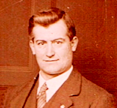

Alfonso Pacitti
1887-1940
Cerasuolo
Alfonso Pacitti
December 2022
Alfonso probably arrived in Scotland around 1905, just after he had reached the age of 18.
one of the earliest official documents about him is his
military record from Campobasso in Italy.
This indicates that we was called up to the Italian Army as part of his military service requirement. The 1911 census recorded that Alfonso was boarding with his elder brother Michele at 162 Clydesdale Road, Bothwell and his occupation was given as confectioner.
In the 1921 Scottish census, he was living with his yung family at 140 George Street, Glasgow - the home of Enrico Tortolani, his father-in-law.
Over the next decades, Alfonso built a thriving set of businesses that covered furniture, shop fitting and a café.
Given that he came to Scotland not being able to speak the local language and with little schooling, this was typical of the enterprising and hard working immigrants.
On 10th June 1940 Italy renounced its previous neutrality and aligned with Hitler’s Germany. Immediately, UK Prime Minister Churchill issued the decree that all Italian nationals and sympathisers; German and Austrian nationals had previously been included in the initial decree of 1939; and others of foreign origin should be interned under a perceived but totally unsubstantiated Fifth Column threat.
Shortly afterwards and without warning, Alfonso, together with his son Alberto, were taken by two local policemen, very late in the evening, from their home at George Street, Glasgow to the Central Police Station, located at Turnbull Street, not far from their home. Alfonso and Alberto were separated as they were being processed and they were never to see each other again. Alberto was taken to Barlinnie Prison at Glasgow and subsequently interned in the Isle of Man. Alfonso was taken firstly to a holding camp at Edinburgh and then shortly adfterwards to the Internment Camp at Warth Mills, Bury.
Alfonso was kept at the camp in Bury for over two weeks; my maternal grandfather, Silvio Bertolini was also kept there. The camp at Warth Mills was the site of a derelict cotton mill. What little light there was came through a glass roof; the broken and missing panes let the rain through. The lavatories were filthy and there were only a few cold water taps serving over 500 men. Sleeping arrangements comprised wooden boards covered by a few blankets. A delegate from the Geneva based Red Cross visited the site and reported on the dilapidated and inhumane conditions. Little was done about it.
On Sunday 30th June, groups of internees from various camps were taken to Liverpool docks and forcibly embarked on the SS Arandora Star for transfer to internment camps in Canada.
Just into his fifties, Alfonso’s life had been cut short in its prime. For over 30 years he had prospered in his new adopted land of Scotland and city of Glasgow. Having arrived as probably an illiterate young man, he developed new skills and quickly adapted to his new environment. Happily married with six children, a growing and successful business, all this was torn from him in a few short weeks. The torture of being separated from all those he loved, without any chance of saying goodbye, and with no communication or knowledge of what was to happen to him, must have been unbearable. Even worse, back home in his adopted city of Glasgow, his wife Giulia did not know where he was and to where he was being taken. The first news she received of him was news of his death.
The unfolding tragedy meant that everything that Alfonso had struggled for and achieved would be destroyed. The Pacitti family he left behind would now have to start all over again — and with little understanding how matters would stand after hostilities ended; as they undoubtedly would.